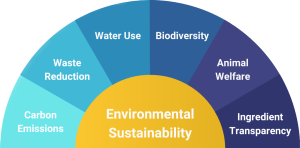Sustainability
Michigan Dining recognizes the social and environmental responsibility that comes along with feeding thousands of students each day. MDining works to promote sustainability in all that we do, both for all people and for our planet. Click on the image below to learn more about what we are doing to make MDining more sustainable!
- National Association of College and University Food Service Awards
- 2023: Michigan Dining was awarded Gold in the Outreach and Education category for the Carbon Neutrality Acceleration Program and implementing carbon labeling
- 2022: Michigan Dining was awarded silver for Know Where to Throw and Gold for Procurement Practices
- All MDining facilities were certified for platinum, the highest level attainable, in sustainability in 2015 by the University of Michigan Office of Campus Sustainability
To learn more about sustainability at Michigan, check out Planet Blue.



